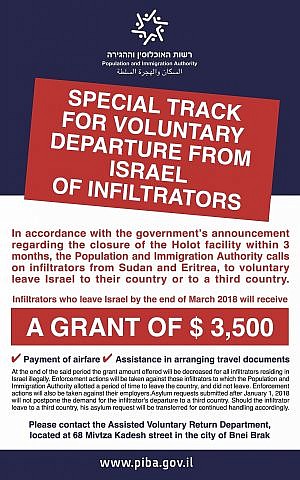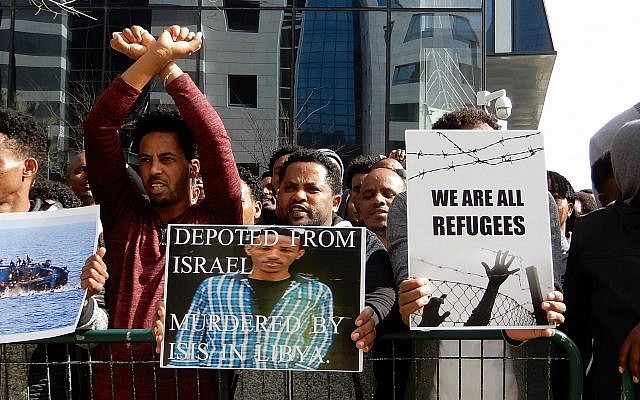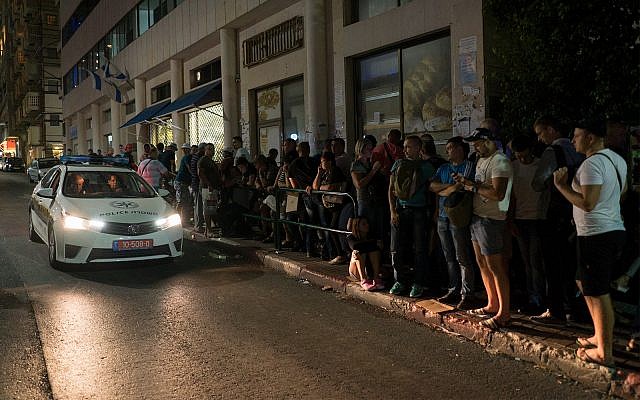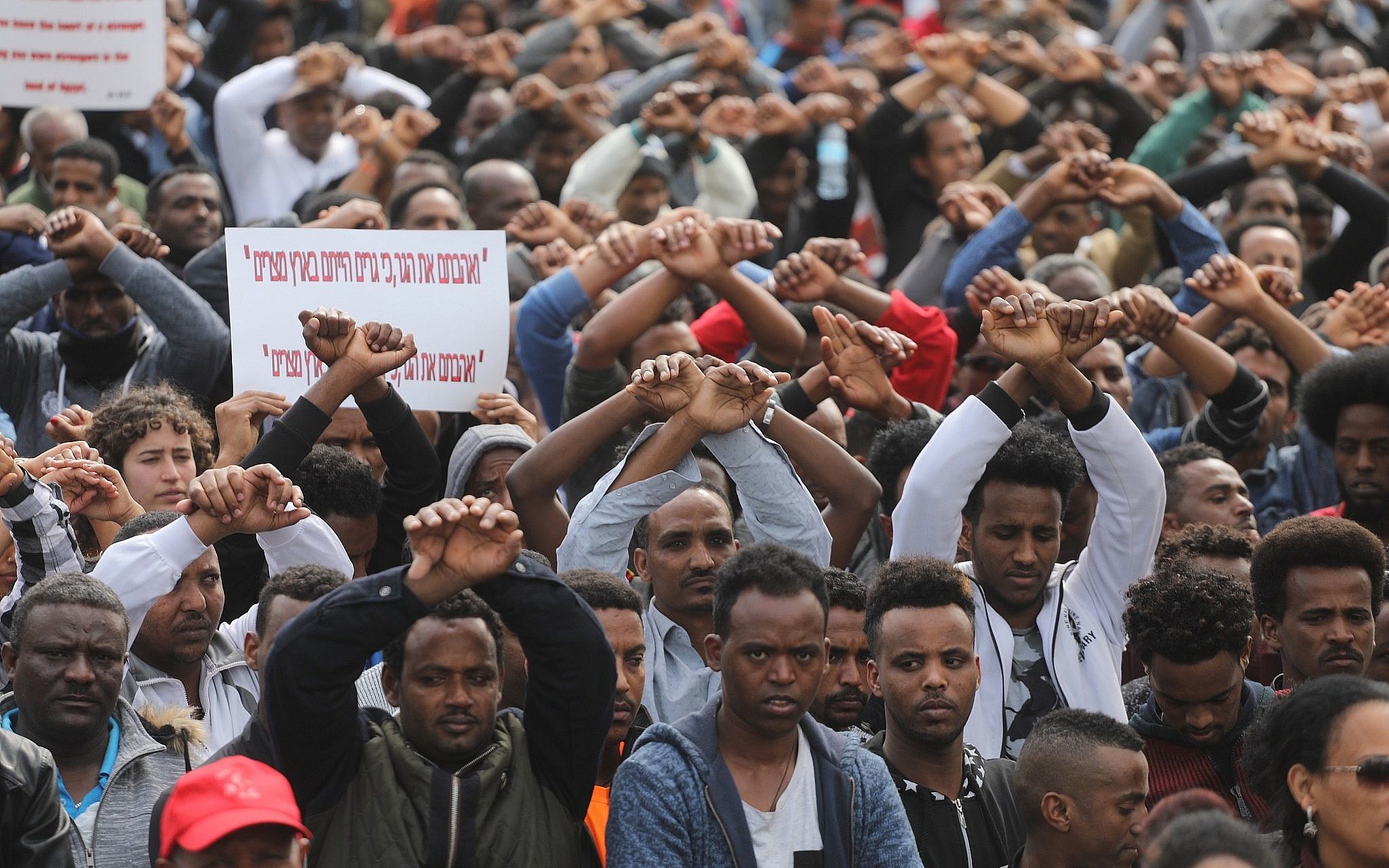Israel is in negotiations with the United Nations High Commission on Refugees to resettle a portion of African asylum seekers in third countries deemed by the UN to be “safe,” possibly including Western countries, in exchange for some of the refugees to be given permanent residency in Israel.
The deal would likely halt Israel’s current campaign to deport thousands of asylum seekers to African countries, widely believed to be Rwanda and Uganda.
“Such an arrangement could be realized, though the necessary details need to be worked out,” said Sharon Harel, the external relations officer at the UNHCR office in Israel.
She declined to name the countries interested in absorbing the refugees or what percentage of the refugees would be able to stay in Israel. Since 2013, the UNHCR, working with a number of different countries, has resettled 2,400 asylum seekers in third countries which they consider safe, including the US and Canada.
Harel said was confident that an agreement could offer a viable solution for the approximately 38,000 African asylum seekers currently in Israel. “We would see such an arrangement as a win-win for the refugees as well as the State of Israel,” said Harel.
The Prime Minister’s Office refused multiple requests for comment.
The UNHCR, as well as a number of human rights organizations have expressed dismay with Israel’s program of deporting asylum seekers to third countries, which were officially unnamed. Reports have named Rwanda and Uganda, which are listed by the UN as “areas of concern.”

The flyers distributed around South Tel Aviv by the Population Immigration and Border Authority on February 2, 2018. (courtesy)
“Due to the secrecy surrounding this policy and the lack of transparency concerning its implementation, it has been very difficult for UNHCR to follow up and systematically monitor the situation of people relocated to these African countries,” the UNHCR
said in a statement in November. “UNHCR, however, is concerned that these persons have not found adequate safety or a durable solution to their plight and that many have subsequently attempted dangerous onward movements within Africa or to Europe.”
Israel has deported approximately 4,000 asylum seekers to Rwanda and Uganda since December 2013, when the deportation program started.
A new law shuttering a holding facility and forcing asylum seekers to leave or go to jail has seen Israel kick off a fresh deportation campaign this week. Israel
began handing out deportation notices to asylum seekers renewing their two-month visa on Sunday.
According to reports, the government hopes to
deport 600 asylum seekers per month for the first year. People with open asylum applications cannot be deported before the applications are resolved.
“International law places obligations on countries and it also gives them rights. There is an obligation to accept refugees, and we accept refugees,” he said, “but international law also gives the right to a country to remove from its borders illegal migrants. We have no obligation to allow illegal labor migrants who are not refugees to remain here.”
Netanyahu also claimed that George Soros was funding protests against the deportations, a claim that Soros quickly denied.
Thousands of asylum seekers
protested on Wednesday in front of the Rwandan embassy, part of a number of protests against the deportation in front of at least ten Rwandan embassies and consulates around the world. Protesters carried signs reading, “We will not fall into despair, we will stop this deportation,” “Recognizing refugees is a moral requirement,” “We don’t believe the racists,” and “Kagame — We’re not for sale.”
Eritrean activists have said that they believe around 20 deported asylum seekers have lost their lives in dangerous attempts to reach Europe.

Friends of Tesfe Kidane, an Eritrean asylum seeker deported to Rwanda two years ago, hold up his picture at a protest outside of the Rwandan embassy in Herzilya on January 22, 2018. Kidane was murdered in Libya while trying to flee to Europe. (Melanie Lidman/Times of Israel)
Deportees to Rwanda
have told The Times of Israel, and it has been
widely reported in foreign media, that they are kept for a few days in a private home and then taken to the border with South Sudan or Uganda in the middle of the night. They are told to cross without documents, and to request asylum seeker status in the new country when they cross the border.
“Willing deportation” means that an asylum seeker has signed an agreement with the Interior Ministry that they are leaving Israel under their own free will, generally after being made to decide between incarceration and deportation.
Asylum seekers who sign documents that they are willingly leaving the country receive a deportation grant of $3,500.
Backers of the asylum seekers’ protest insist that Israel has not been doing the minimum required by the 1951 Refugee Convention to ascertain whether the migrants are refugees. Between 2009 and 2017, 15,400 people opened files seeking asylum with the PIBA Office. Israel denied asylum seeker status to 6,600 people, and 8,800 applications for asylum are still open. Israel has
recognized refugee status for one Sudanese and 10 Eritreans, out of thousands of applications for asylum, an acceptance rate of 0.056%.
African asylum seekers and human rights activists protest against the deportation plan in front of the Rwandan embassy in Herzliya, on February 7, 2018. (Miriam Alster/Flash90)
The European Union has recognized asylum claims from 90% of Eritreans who apply for refugee status and 56% of Sudanese, according to the
European Stability Institute.
Harel, the spokesperson for UNHCR in Israel, noted there had been some “gaps” in the procedural requirements for asylum seekers. Asylum seekers from Eritrea and Sudan who arrived in Israel before 2012 were originally not required to file requests for asylum. The policy change in 2012 was not formally announced and led to a lot of confusion among asylum seekers as to what they were required to do.

The line late at night outside the office of the Population Immigration and Border Authority, September 29, 2017. (Luke Tress/Times of Israel)
Anat Perez, a 25-year resident of Neve Shaanan who is also part of the Central Bus Station Neighborhood Watch group, which supports the deportations, said she does not believe that the UNHCR negotiations will amount to much. “The United Nations can make all types of decisions, but at the end it’s really about what Israel decides will do,” said Perez. “All of these issues were checked by the High Court. Israel is answering all of the requirements in terms of the law.”
“I think if they are deported, things will get better for us,” said Perez. Perez added that she was frustrated by all calls that she and other activists who support the deportations are racists or Nazis. “They can’t judge us, they need to deal with South Tel Aviv’s Israeli residents with more respect. They don’t understand the problems,” she said.
Halefom Sultan, a 33-year-old father of two from Eritrea and one of the central organizers of the protest outside the Rwandan embassy on Wednesday, said he supports the UN negotiations that would send some asylum seekers to a third country, one that is deemed safe by the UN, and allow some asylum seekers to stay in Israel.
“They need to safeguard our life in the place we are located,” said Sultan. “It doesn’t matter where we are, we need safety. If it’s done by the UN and done in a safe way that ensures our security, I support it.”
“This is an important move; it should have happened a while back,” said Mutasim Ali, a law student and activist who is the
only Sudanese to have received refugee status in Israel. “This is the role UNHCR is supposed to play. It’s unfortunate that Israel still wants to relocate people when they have the ability to accept them, but we support the UNHCR’s approach.”
| | | | UNHCR in talks to send African migrants to ‘safe’ countries, let others stay UNHCR confirms talks with Israeli and foreign governments to find a final status deal that would enable some asy... | | | |




